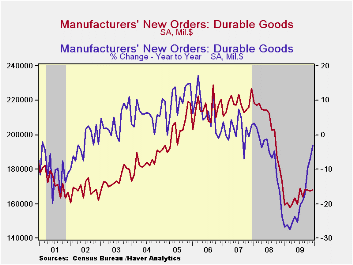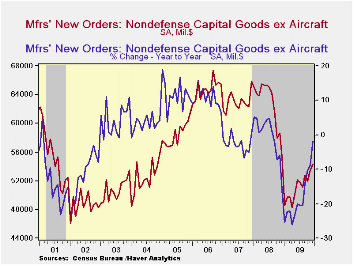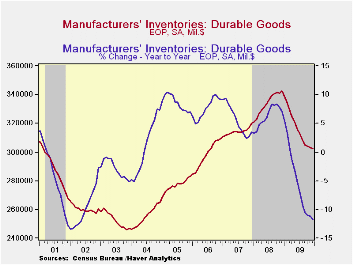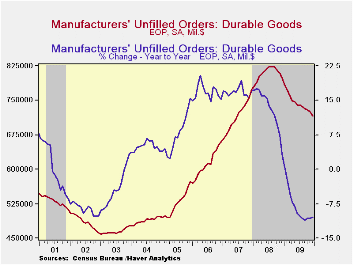 Global| Jan 28 2010
Global| Jan 28 2010U.S. Durable Goods Orders' Improvement Abates
by:Tom Moeller
|in:Economy in Brief
Summary
The pace of improvement in factory sector activity eased after material improvement early last year. Durable goods orders during December provided another indication of a slower rate of gain with a 0.3% increase following two months [...]
 The pace of improvement in factory sector activity eased after
material improvement early last year. Durable goods orders during
December provided another indication of a slower rate of gain with a
0.3% increase following two months of modest declines which were
revised lower. A 2.0% December increase had been the Consensus
expectation. The recently flat orders pattern nevertheless left orders
6.3% above the March low. For all of last year, orders fell 19.9%
following a 6.0% drop during 2008.
The pace of improvement in factory sector activity eased after
material improvement early last year. Durable goods orders during
December provided another indication of a slower rate of gain with a
0.3% increase following two months of modest declines which were
revised lower. A 2.0% December increase had been the Consensus
expectation. The recently flat orders pattern nevertheless left orders
6.3% above the March low. For all of last year, orders fell 19.9%
following a 6.0% drop during 2008.
Transportation sector orders provided much of the shortfall
during the last two months with 2.0% and 8.1% declines.  These were led
by sharply lower orders for nondefense aircraft & parts which
fell by one-half during all of last year after a one-third 2008
decline. New orders for motor vehicles & parts improved
slightly during the second half of 2009 but were off by one-quarter for
the year.
These were led
by sharply lower orders for nondefense aircraft & parts which
fell by one-half during all of last year after a one-third 2008
decline. New orders for motor vehicles & parts improved
slightly during the second half of 2009 but were off by one-quarter for
the year.
Primary metals orders improved sharply during the second half of last year but still were off by one-third for 2009. Machinery orders also improved steadily during the second half but fell 25% for the year as a whole. Electrical equipment orders were volatile m/m and fell 19.1% for the year. Orders for computers & related equipment also showed sketchy improvement late in the year but nevertheless fell 10.6% for 2009 overall.
Capital goods orders ended 2009 on a firm note. Nondefense capital goods orders less aircraft rose 1.3% (-2.0% y/y) and rose 12.3% from the April low.
Shipments of durable goods jumped 2.9% during December (-3.9% y/y) and firmed by 7.2% during the second half of 2009. Shipments of primary metals have been notably strong (2.0% y/y) logging a one-third increase since mid-year. Machinery shipments also firmed late in the year (-16.0% y/y) as did electrical equipment shipments (-8.4% y/y).
Perhaps the factory sector's inventory cycle is ending but it's not over. Durable goods inventories slipped 0.2% during December (-11.3% y/y) after similar declines during the prior two months. These declines followed monthly drops between 1.0% and 1.7% during the first nine months of the year. As a result of the decumulation the ratio of inventories-to-shipments was at its lowest since October of 2008, off sharply from the January high.. The pace of the decline in unfilled orders accelerated at a yearend with a 1.2% drop (-10.4% y/y) after a 0.7% November decline. The transportation sector saw the largest shortfall (-11.7% y/y). Less transportation, backlogs were roughly unchanged during the last three months of 2009 (-8.7% y/y).


| NAICS Classification (%) | December | November | October | Y/Y | 2009 | 2008 | 2007 |
|---|---|---|---|---|---|---|---|
| Durable Goods Orders | 0.3 | -0.4 | -0.1 | -3.1 | -19.9 | -6.0 | 1.4 |
| Excluding Transportation | 0.9 | 2.1 | -0.5 | 0.5 | -17.4 | -1.4 | -0.3 |
| Nondefense Capital Goods | -0.2 | -3.0 | 2.0 | -2.2 | -24.0 | -7.0 | 3.6 |
| Excluding Aircraft | 1.3 | 3.1 | -1.8 | -2.0 | -18.3 | -0.5 | -2.7 |
Tom Moeller
AuthorMore in Author Profile »Prior to joining Haver Analytics in 2000, Mr. Moeller worked as the Economist at Chancellor Capital Management from 1985 to 1999. There, he developed comprehensive economic forecasts and interpreted economic data for equity and fixed income portfolio managers. Also at Chancellor, Mr. Moeller worked as an equity analyst and was responsible for researching and rating companies in the economically sensitive automobile and housing industries for investment in Chancellor’s equity portfolio. Prior to joining Chancellor, Mr. Moeller was an Economist at Citibank from 1979 to 1984. He also analyzed pricing behavior in the metals industry for the Council on Wage and Price Stability in Washington, D.C. In 1999, Mr. Moeller received the award for most accurate forecast from the Forecasters' Club of New York. From 1990 to 1992 he was President of the New York Association for Business Economists. Mr. Moeller earned an M.B.A. in Finance from Fordham University, where he graduated in 1987. He holds a Bachelor of Arts in Economics from George Washington University.
More Economy in Brief
 Global| Feb 05 2026
Global| Feb 05 2026Charts of the Week: Balanced Policy, Resilient Data and AI Narratives
by:Andrew Cates






